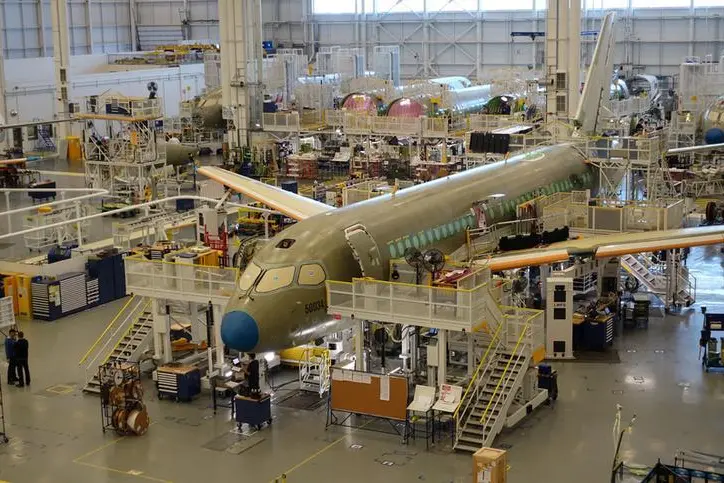PHOTO
MONTREAL - Europe's Airbus is ratcheting up pressure on suppliers like United Technologies to cut costs for its Canadian-developed A220 jetliner as it expands factory facilities to cope with anticipated demand for the former Bombardier model.
Long seen as low on the list of priorities for top suppliers as Canada struggled to break into the main airliner market, the A220 now has the clout of the world's second largest planemaker behind it after Airbus bought the loss-making project last year.
Philippe Balducchi, head of an Airbus-led venture which took over production last July, said the planemaker was looking for a "significant double-digit" percentage reduction in costs but played down suggestions that it could slash costs by half.
Speaking at the Mirabel airplane plant outside Montreal which Bombardier now shares with Airbus, Balducchi indicated the bulk of the reduction in costs would come from the supply chain as Airbus uses its greater clout in negotiations for parts.
Other savings would come from more efficient operations as workers gain experience of building the lightweight 110-130-seat jet, whose deliveries doubled to 33 aircraft last year.
However, overall economies will go "way beyond" what Airbus can achieve internally on the assembly line, Balducchi said.
"Our focus is to sell, ramp up (production) and reduce costs on the A220," Rob Dewar, head of engineering and customer support, added during a media briefing on the jet, which was known as the CSeries until Airbus took control in July 2018.
Cutting costs is key to lifting the program out of the red while avoiding a repeat of reportedly low prices that fanned trade tensions between the United States and Canada in 2017.
Airbus rival Boeing claimed Bombardier sold airplanes to Delta at unfairly low prices but later lost its complaint.
SUPPLIER LEVERAGE
Airbus declined to discuss individual suppliers but analysts have said it faces a showdown over costs with United Technologies, whose Pratt & Whitney unit supplies engines and whose other systems make it by far the largest A220 supplier.
"It depends how you define significant, but it will be a difficult task," said Leeham analyst Scott Hamilton, noting that Pratt & Whitney is emerging from its own industrial problems.
"Pratt is going to be reluctant to give concessions, but Airbus has some pretty good leverage," he added.
To maximize its clout, Airbus waited until winning a batch of new orders for the jet before turning up the heat on suppliers, grabbing their attention with sales of 135 of the planes to U.S. airlines including a follow-on order from Delta.
"That was the strategy, to get the sales first. Now you can go to suppliers and say look, this is real," said one executive.
The A220 consortium, which also includes Bombardier and the Quebec government, is spending $30 million to expand the Mirabel plant and will break ground this week on a new A220 assembly line in Alabama to meet demand from U.S. airlines.
It plans to raise Mirabel capacity to 10 A220s a month by the middle of next decade, with four a month in Alabama - though for now about half of the known orders are from the United States.
Airbus meanwhile said the jet had won approval to fly up to three hours away from the nearest airport in the event of a shutdown of one of its two engines, a safety standard which supports its use on longer-range routes.
Extended operations or ETOPS approval was granted by Canada and affects the number of routes jets can fly over water or remote areas. U.S. and European approvals are pending.
(Reporting by Tim Hepher; Editing by Richard Lough and Jan Harvey)
© Reuters News 2019





















